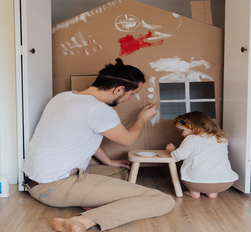Creating a Healing Environment
By Erica Marriaga, MSW, LCSW

Have you noticed an increase in difficulty managing your child’s behavior?
If you answered yes or had to think about it for a moment, chances are you can relate. Their lives have been turned upside down. If you think back to your childhood, do you remember sitting and staring at a computer screen for hours on end? Did you need technology to allow you to participate in school? Were you worried about not being socially distant from a classmate or not being able to see your best friend for weeks? Or, were you more focused on what you would be playing during recess? Remembering a great place to hide when playing manhunt or hide and seek?
It makes sense that with all the stimulation, it is more difficult to calm and support our children. I am not going to tell you how to be a parent, nor am I going to criticize you. Instead, I want to empower you to do your due diligence. These are not fool-proof ideas that will allow you to wake up tomorrow with all resolved. Hear me out, and see what you think. I bet you already do or say some of these things without realizing it.
How can you create a healing environment with your parenting?
Can you remember a time as a child when you were told, “Great job, I am so proud of you”? What about “You make me so angry and annoyed when you don’t listen to a word I say”?
Which statement did you remember more easily? The positive or negative? What if the negative comment was made more frequently, on a consistent basis? Do you think that would help you remember it better? If so, you are correct.
You see, the way we speak to others, especially our children, can have many implications. Our tone of voice, our facial gestures, and body posture, along with the information communicated can help us model positivity or negativity.
How can you demonstrate your love through actions?
Words lack meaning and value if a child does not feel a parent’s love through attention, affection, and caring behaviors.

Social Learning Theory identifies that behaviors are learned and are modelled for us at a young age. As parents, we have the opportunity to model behaviors that we would like to see in our children. For example, if I want my child to speak in a respectful manner, I would show them respect by maintaining eye contact, speaking in a regular tone of voice, and smiling.
What did you want from your parents when you were younger? A hug, a high five, for them to tell you they love you? Give those displays of affection to your children. Some other strategies for demonstrating love are spending quality time alone with each of your children, and actively listening to your children. Put your phone away when you are talking with them to model appropriate listening behaviors.
How can you empower your children?
Empowering children is a process. Start by showing interest in their life and experiences. Children are able to learn valuable lessons and better understand themselves when they have the opportunity to have meaningful conversations with an adult who values their input and experience. Listen more, talk less.
Avoid judging and criticizing them. Note the difference between criticizing and correcting! As parents, it is essential that we correct our children, but it can be damaging when we criticize our children. Criticizing is making judgement statements about them as a person, while correcting is making statements about their behavior. Correct bad behavior, but remind your children that you love who they are as a person.
Allow them the freedom to do things independently and create their own mistakes. As parents, we often feel the urge to step in and keep them from missteps, we must remember that it is okay for them to mess up, especially if you are there to help them problem-solve.
How can you include all immediate family members in a positive way?
Create a dependable and consistent environment at home. Set aside time to have a family night and build a close relationship. Provide positive reinforcement and praise for accomplishments and provide encouragement and gentle, constructive feedback for failures.

Allow children to participate in making appropriate family decisions. This helps them see value in their role in the family. What are they contributing to? This will also help them with their self-esteem.
Any thoughts? Are you already incorporating some of these things into the family routine?
If you have noticed that these ideas were a bit difficult or you are more aware of changes you want to make in creating a healing environment for you and your family, you have come to the right place! A licensed therapist or counselor can help you be the best parent you can be.
Erica Marriaga is a proud fur-mama of her one-eyed rescue dog, Toby, and new puppy, Tucker. She loves to spend time with her husband and bond with her family, nieces, and nephews. Erica is passionate and enthusiastic about her role as a therapist.
Check out Erica’s professional bio here!
EWC has locations in Manalapan and Shrewsbury, NJ, and accepts a variety of insurances.
Email Us: info@exceptionalwellnesscounseling.com
Call Now: (908) 415-2042
NEXT STEPS & RESOURCES
- Are you ready to take your first step? Reach out to us.
- Do you feel your child may benefit from counseling during this time? Take the first step.
- Interested in online counseling? Learn more.
- Resources

